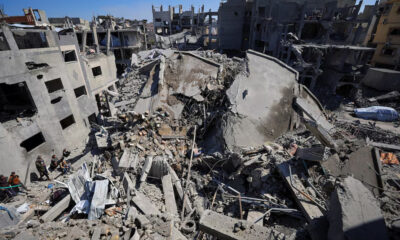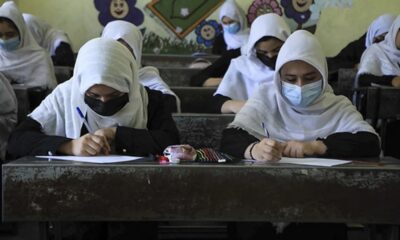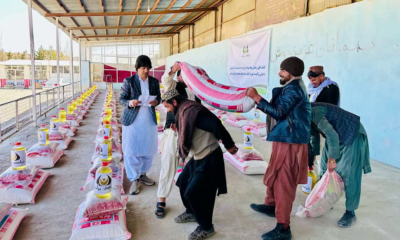COVID-19
Kabul’s municipal bus service suspended due to COVID crisis

Kabul municipality on Thursday said it had suspended the municipal bus service until further notice due to the rapid spread of COVID-19 in the country.
Services will be suspended from Saturday, the municipality said.
“The city buses that operate in Kart-e-Naw and Ahmad Shah Baba Mina will be stopped from this Saturday to avoid the spread of coronavirus,” the municipality announced on its Facebook page.
The municipality stated that the service will resume once the infection rate levels out.
The municipality also called on all drivers to keep their passenger numbers low in vehicles and for all members of the public to adhere to health protocols including social distancing regulations and the wearing of masks.
This comes after the Ministry of Public Health on Wednesday reported 94 deaths from COVID-19 across the country.
However, analysts have stated that the official tally of COVID cases is far lower than the actual figures.
According to a World Health Organization report late last month, “limited public health resources, lack of people coming forward for testing, as well as the absence of a national death register” could mean that COVID-19 cases and related deaths are underreported in the country.
The report stated that as of 20 May, “only 434,506 tests have been conducted for a population of 40.4 million” since the start of the pandemic. This means that Afghanistan ranked 194 of 220 countries and territories on that day.
Afghanistan’s test-positivity rate of 15 percent also indicates “overall undertesting of potential cases,” said the report. Five days later, on 25 May, of the 3,489 tests conducted countrywide, 24.8 percent were positive, according to Worldometer.
COVID-19
WHO declares end to COVID global health emergency

The World Health Organization said Friday that COVID-19 no longer qualifies as a global emergency, marking a symbolic end to the devastating coronavirus pandemic that triggered once-unthinkable lockdowns, upended economies and killed millions of people worldwide.
The announcement, made more than three years after WHO declared the coronavirus an international crisis, offers some relief, if not an ending, to a pandemic that stirred fear and suspicion, hand-wringing and finger-pointing across the globe, AP reported.
The U.N. health agency’s officials said that even though the emergency phase was over, the pandemic hasn’t finished, noting recent spikes in cases in Southeast Asia and the Middle East.
WHO says thousands of people are still dying from the virus every week, and millions of others are suffering from debilitating, long-term effects.
“It’s with great hope that I declare COVID-19 over as a global health emergency,” WHO Director-General Tedros Adhanom Ghebreyesus said.
“That does not mean COVID-19 is over as a global health threat,” he said, warning that new variants could yet emerge. Tedros noted that while the official COVID-19 death toll was 7 million, the real figure was estimated to be at least 20 million.
Tedros said the pandemic had been on a downward trend for more than a year, acknowledging that most countries have already returned to life before COVID-19.
He bemoaned the damage that COVID-19 had done to the global community, saying the pandemic had shattered businesses, exacerbated political divisions, led to the spread of misinformation and plunged millions into poverty.
When the U.N. health agency first declared the coronavirus to be an international crisis on Jan. 30, 2020, it hadn’t yet been named COVID-19 and there were no major outbreaks beyond China.
More than three years later, the virus has caused an estimated 764 million cases globally and about 5 billion people have received at least one dose of vaccine.
In the U.S., the public health emergency declaration made regarding COVID-19 is set to expire on May 11, when wide-ranging measures to support the pandemic response, including vaccine mandates, will end. Many other countries, including Germany, France and Britain, dropped most of their provisions against the pandemic last year.
When Tedros declared COVID-19 to be an emergency in 2020, he said his greatest fear was the virus’ potential to spread in countries with weak health systems.
Most recently, WHO has struggled to investigate the origins of the coronavirus, a challenging scientific endeavor that has also become politically fraught.
COVID-19
COVID-19 in Iran: Nearly 900 new cases, 24 deaths recorded

The Iranian health ministry announced on Sunday that more than 890 new cases of COVID-19 have been identified across the country during the past 24 hours, adding that 24 patients have died in the same period of time, Fars News Agency reported.
“A sum of 891 new patients infected with COVID-19 have been identified in the country based on confirmed diagnosis criteria during the past 24 hours,” the Iranian Health Ministry’s Public Relations Center said on Sunday, adding, “454 patients have been hospitalized during the same time span.”
The ministry’s public relations center said 611 people infected with COVID-19 are in critical condition.
COVID-19
China says 200 million treated, pandemic ‘decisively’ beaten

China says more than 200 million of its citizens have been diagnosed and treated for COVID-19 since it lifted strict containment measures beginning in November.
With 800,000 of the most critically ill patients having recovered, China has “decisively beaten” the pandemic, according to notes from a meeting of the ruling Communist Party’s all-powerful Politburo Standing Committee presided over by President and party leader Xi Jinping, AP reported.
China enforced some of the world’s most draconian lockdowns, quarantines and travel restrictions and still faces questions about the origins of the virus that was first detected in the central Chinese city of Wuhan in late 2019. Heavy-handed enforcement prompted rare anti-government protests and took a heavy toll on the world’s second-largest economy.
The official Xinhua News Agency quoted Xi as saying that policies to control the outbreak had been “entirely correct.” The abrupt lifting in November and December of the “zero COVID” policy that had sought to eliminate all cases of the virus led to a surge in infections that temporarily overwhelmed hospitals.
Case numbers have since peaked and life has largely returned to normal, although international travel in and out of China has yet to return to pre-pandemic levels.
China is now transitioning to a post-pandemic stage after a fight against the outbreak that was “extraordinary in the extreme,” Xinhua said.
The government will continue to “optimize and adjust prevention and control policies and measures according to the times and situations with a strong historical responsibility and strong strategic determination,” Xinhua said.
-

 Regional5 days ago
Regional5 days agoEgypt makes new proposal to restore Gaza truce as Israeli strikes kill 65
-

 International Sports5 days ago
International Sports5 days agoIPL 2025: Last over drama; Ashutosh Sharma clinches win for Delhi Capitals
-

 Sport5 days ago
Sport5 days agoAfghanistan eliminated from Asian Beach Soccer Championship
-

 Latest News5 days ago
Latest News5 days agoNorwegian Refugee Council cuts back on essential humanitarian services in Afghanistan
-

 Latest News5 days ago
Latest News5 days agoUN warns over 4 million Afghan girls will be deprived of education by 2030 if ban continues
-

 World4 days ago
World4 days agoSecretive Chinese network tries to lure fired US federal workers, research shows
-

 Latest News4 days ago
Latest News4 days agoDozens of needy families in Ghazni get much needed food aid from Bayat Foundation
-

 Sport4 days ago
Sport4 days agoAFC Asian Cup 2027 Qualifiers: Myanmar defeat Afghanistan 2-1
























